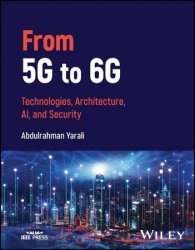From 5G to 6G: Technologies, Architecture, AI, and Security
- Добавил: literator
- Дата: 11-07-2023, 03:54
- Комментариев: 0
 Название: From 5G to 6G: Technologies, Architecture, AI, and Security
Название: From 5G to 6G: Technologies, Architecture, AI, and SecurityАвтор: Abdulrahman Yarali
Издательство: Wiley-IEEE Press
Год: 2023
Страниц: 224
Язык: английский
Формат: epub (true)
Размер: 10.1 MB
Understand the transition to the sixth generation of wireless with this bold introduction.
The transition from the fifth generation of wireless communication (5G) to the coming sixth generation (6G) promises to be one of the most significant phases in the history of telecommunications. The technological, social, and logistical challenges promise to be significant, and meeting these challenges will determine the future of wireless communication. Experts and professionals across dozens of fields and industries are beginning to reckon seriously with these challenges as the 6G revolution approaches.
From 5G to 6G provides an overview of this transition, offering a snapshot of a moment in which 5G is establishing itself and 6G draws ever nearer. It focuses on recent advances in wireless technology that brings 6G closer to reality, as well as the near-term challenges that still have to be met for this transition to succeed. The result is an essential book for anyone wishing to understand the future of wireless telecommunications in an increasingly connected world.
Artificial Intelligence (AI) is a system or machine that simulates human thought processes. Most AI systems are not sentient, but instead use algorithms to think like humans and make calculations. While these might seem underwhelming at first, they can actually be used with another breakthrough known as ML (Machine Learning). Machine Learning is the process of using pattern recognition to let computers learn without being programmed to do the task at hand. This is what can make them so much like humans. With the ability to learn from things that happen, AI can complete tasks many thought machines would never be able to do.
The real magic happens when we combine AI with Internet of Things (IoT), so we give machines that have the ability to learn the ability to communicate with each other. This is what can create some of the most amazing breakthroughs in technology. For example, when Tesla Motors Inc. decides to upgrade a part of its cars, it is able to do it remotely. When Tesla experienced a sudden power‐steering failure in its Model S electric sedan, technicians at the carmaker's California headquarters quickly pinpointed the likely cause – an electrical connector that had been damaged three days earlier by an overzealous employee using a standard air gun to remove adhesive from an assembly line. This is just one example of how AI and IoT combine to make something amazing. With these two technologies, we can create products and features that weren't originally thought of before.
From 5G to 6G readers will also find:
6G applications to both AI and Machine Learning, technologies which loom ever larger in wireless communication
Discussion of subjects including smart healthcare, cybersecurity, extended reality, and more
Treatment of the ongoing infrastructural and technological requirements for 6G
From 5G to 6G is essential for researchers and academics in wireless communication and Computer Science, as well as for undergraduates in related subjects and professionals in wireless-adjacent fields.
Contents:
Скачать From 5G to 6G: Technologies, Architecture, AI, and Security
Внимание
Уважаемый посетитель, Вы зашли на сайт как незарегистрированный пользователь.
Мы рекомендуем Вам зарегистрироваться либо войти на сайт под своим именем.
Уважаемый посетитель, Вы зашли на сайт как незарегистрированный пользователь.
Мы рекомендуем Вам зарегистрироваться либо войти на сайт под своим именем.
Информация
Посетители, находящиеся в группе Гости, не могут оставлять комментарии к данной публикации.
Посетители, находящиеся в группе Гости, не могут оставлять комментарии к данной публикации.

